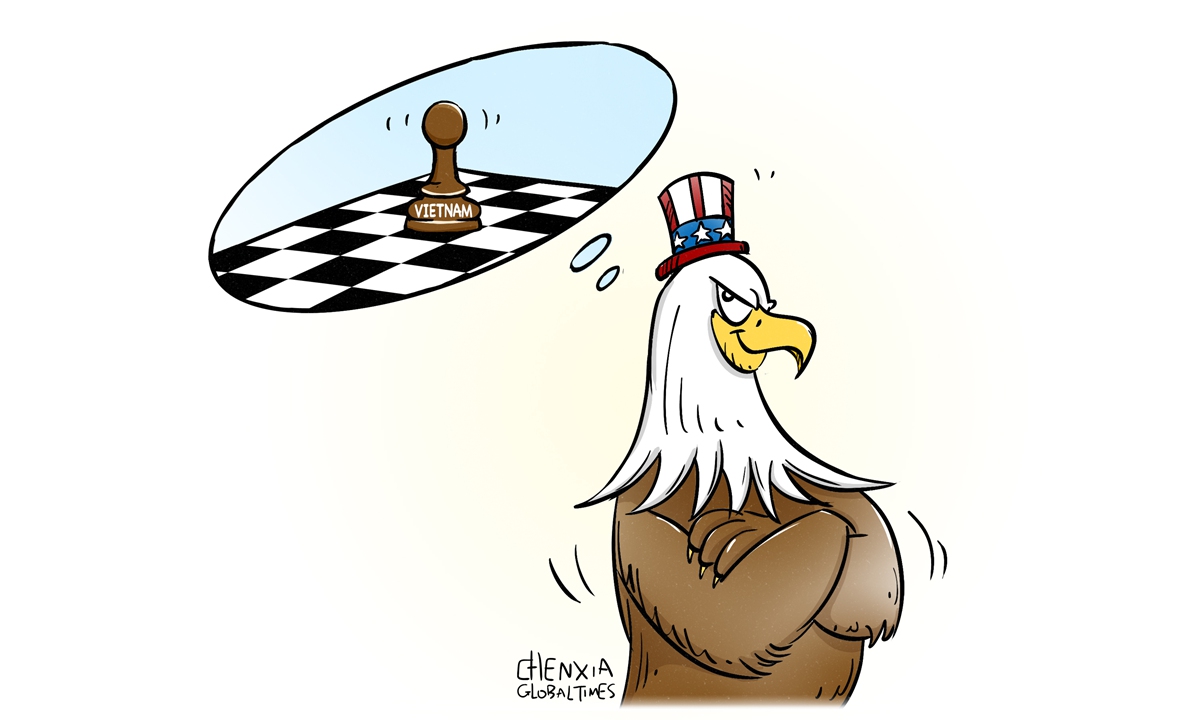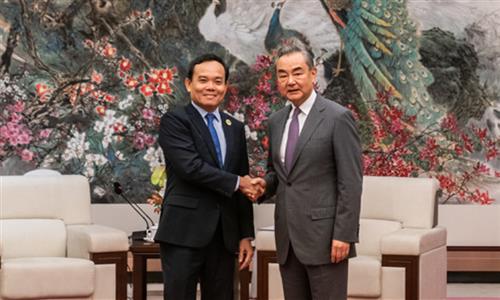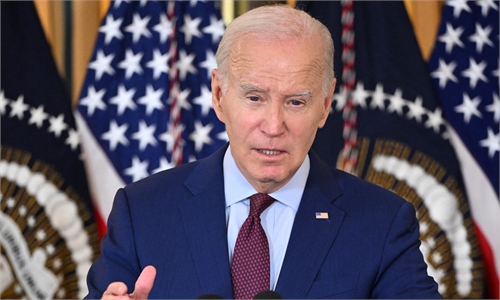
Illustration: Chen Xia/Global Times
US President Joe Biden is set to visit Vietnam on Sunday. The focus of Western media is whether the US will elevate its diplomatic relations with former foe Vietnam to a higher level, but Washington's geopolitical game may not be Hanoi's point of interest.Although Western media outlets are trying to hype the topic of geopolitical competition and containing China, we believe Vietnam's current concern may be economic issues, or, to be frank, what benefit could Vietnam's export-oriented economy gain from Biden's visit?
One of Asia's fastest-growing economies in recent years, Vietnam's economic growth has slowed from 8 percent in 2022 to 3.7 percent in the first half of 2023, putting great pressure on meeting its GDP growth target of 6.5 percent for this year. Vietnam is an export-oriented economy. However, its exports in August fell 7.6 percent from a year earlier, marking a sixth straight month of decline as weak global demand weighs on its economy. In particular, Vietnam's January-August exports to some of its key markets fell from a year earlier, down 19.1 percent to the US, according to Reuters.
The US is Vietnam's largest export market. It's natural that Vietnam is seeking to further develop its relations with the US. However, what Vietnam needs is not empty political promises, but tangible economic benefits. Washington may be eager to upgrade relations with Hanoi, but Biden should think about first what he can do to strengthen economic and trade cooperation, and, at the very least, prevent further trade decline.
Of course, we hope Biden's visit can bring good news to Vietnam's export-oriented economy, if he actually can do so. The US is Vietnam's largest export market for garments, electronics and smartphones. The growth of exports to the US can not only promote economic development in Vietnam, but also push up the imports of raw materials, intermediate products, machinery and equipment. And, a large part of this comes from China. So, the increase in Vietnam's exports to the US will indirectly push up Vietnam's imports from China.
In 2022, Vietnam's exports to the US rose by 13.6 percent. At the same time, China's exports to Vietnam denominated in yuan increased by 10.3 percent. With the continuous integration of the Asian industrial chain and the China-Vietnam supply chain, there is a growing correlation between China's exports to Vietnam and Vietnam's exports to the US.
In addition, Vietnam also places great importance on China's consumer market and potential. From this perspective, while Vietnam is strengthening its economic and trade relations with the US, it also needs to strike a balance between Beijing and the Washington. Some US politicians may want to include Vietnam in the US camp against China. This target seems to be always just on the horizon, but forever unreachable. Vietnam cannot unconditionally and completely take sides with the US, nor can it become a pawn for the US to contain China.
The US now faces a dilemma. On the one hand, the US needs to continuously open its domestic market to Vietnam in order to stabilize and improve its relationship with the emerging economy, but Vietnam cannot become a true ally of the US in its China strategy. On the other hand, as the US further strengthens its economic and trade ties with Vietnam, it also promotes trade between Vietnam and China. It is determined by the increasingly integrated industrial and supply chains among China, Vietnam and other Asian countries, which is an objective factor.
China is now a key part of the supply chain covering most of Southeast Asia, including Vietnam, and China's role cannot be replaced by the US. It means although the US has certain influence upon the Asian industrial chain, it cannot trigger disruptive changes. At the very least, it lacks the ability to exclude China from the Asian industrial chain, or sever its economic ties with Asian countries.
In this context, Southeast Asian countries, including Vietnam, cannot decouple from China's economy. On the contrary, these countries may even indirectly strengthen US' economic ties with China, serving as assembly bases to connect China's intermediate product industry chain with the US consumer market.
The author is a reporter with the Global Times. bizopinion@globaltimes.com.cn



